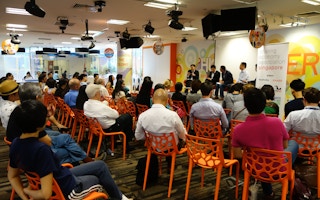A group of six companies in Singapore on Wednesday launched the country’s first ‘sharing economy association’, a move that they say will boost Singapore’s culture of collaborative consumption – that is, when consumers share goods and services with one another rather that relying on commercial companies, primarily through digital and social networks.
The Sharing Economy Association (Singapore) will support the growth of a sharing economy in the city-state by holding quarterly industry networking sessions for businesses, monthly public talks to spread awareness about the sharing economy, and regular consultation dialogues with relevant government agencies to address the challenges and opportunities of this emerging business model.
The sharing economy is a relatively new concept, but is quickly gaining popularities in cities due to densely packed urban infrastructure which facilitates the convenient exchange of goods and services amongst people, and a high concentration of technologically tuned-in residents. Singapore’s fledgling sharing economy culture has been defined by early proponents such as car rental firm Smove, and various co-working spaces which allow individuals and small organisations to rent desks or rooms on a short-term basis.
The association was conceptualised by its president, Eugene Tay, last April, and was formally registered under Singapore’s Registry of Societies more than a year later.
At the launch held at *SCAPE, Moh Hon Meng, chief executive of neighbourhood sharing network Blockpooling, told the audience of about 50 participants that the sharing economy was a particularly apt model for Asia to pursue given its high population density, and the imminent resource challenges posed by a rapidly expanding urban population and middle class.
“We have an ‘Asian Phenomenon’ of high housing density”, but there is minimal interaction amongst neighbours he said. “There may be a florist, a baker, a plumber and electrician living in our block, who could exchange services. People can also share things in their homes, such as ladders, drills, or pooling extra tables and chairs for parties”.
Moh also noted that if every single person attempted to own certain, rarely used items such as ladders or drills themselves, there would be overconsumption and inefficient use of the earth’s resources.
“It would help so many problems if people shared”, he added. “It would reduce fuel consumption and people’s carbon footprints, help people build friendships with neighbours, and decongest transport”.
James Chua, chief executive of accomodation sharing service PandaBed also observed that in addition to the environmental benefits of the sharing economy, certain models, such as accommodation sharing, also had social benefits such as enabling retirees to earn a passive income from their homes.
However, when it comes to Singapore reaping the benefits of a sharing economy, the association members said that legal and cultural barriers still stand in the way.
“
As an association, we are in a stronger position to have more regular and constructive dialogues with the government, where we can sit down with them, understand their concerns, and figure out how to resolve them.
Eugene Tay, president, Sharing Economy Association (Singapore)
A recent move by Singapore’s Housing Development Board (HDB) to confiscate the flats of two homeowners who leased their homes out on a short-term share basis, and widespread global protests against car-sharing app Uber illustrate the regulatory challenges for businesses who operate on the sharing economy model.
This is a particularly acute concern in Singapore, said Moh, where “what is not expressly allowed is considered illegal. For example, carpooling is actually allowed, but as long as it is not explicitly said, Singaporeans will always think it is not allowed”, he added.
An Asian ethos of self-sufficiency may also contribute to an initial reluctance for consumers to borrow goods from one another, a cultural concern that prompted Blockpooling to promote the idea of “pooling resources” rather than simply taking goods from others, shared Moh.
Tay told Eco-Business that these are precisely the challenges that the association aims to tackle to help Singapore’s sharing economy grow and thrive.
“Some of our members are up against legal regulations, and it is going to be a bit tricky to resolve that”, he said. “But as an association, we are in a stronger position to have more regular and constructive dialogues with the government, where we can sit down with them, understand their concerns, and figure out how to resolve them”, he added.
Costas Courcoubetis, professor at the Singapore University of Technology and Design who also spoke at the event identified peer ranking and reputation systems as essential tools to support regulatory efforts.
He cited the rating system used by online marketplace eBay to suggest that while systems like eBay were not subject to central control or oversight, this role was instead fulfilled by reputation and monitoring systems that are coded into the site.
“Reputation systems give buyers and sellers incentives to stay honest”, he added.
The association was set up by six Singapore-based companies which run businesses based on collaborative consumption, namely:
- ‘Waste is not Waste’, an online waste exchange for businesses and organisations
- Rent Tycoons, a peer-to-peer online rental marketplace
- PandaBed, a non-hotel accommodating sharing service
- Leendy, an app that allows individuals to exchange goods
- Blockpooling, an online portal that facilitates sharing between neighbours
- iCarsClub, a car rental company
It is now open for membership to sharing-centric businesses that are based in Singapore.

















